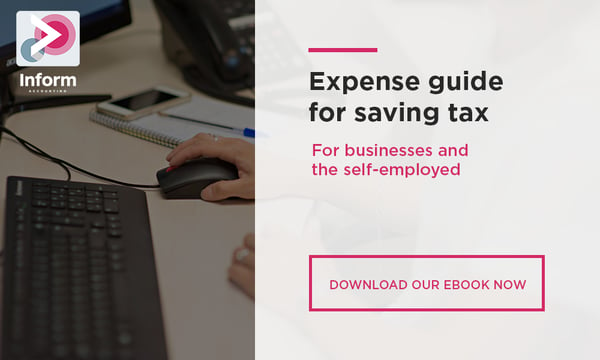BLOG
How, when and why your business needs to register for VAT...

Most business owners already know the threshold for compulsory VAT registration is a taxable annual turnover of £85,000 - but there is often confusion over exactly what counts towards this figure, and how and when a business should register.
In this blog post, we’ll outline the requirements for VAT registration in a little more detail - answering some of the most common questions small businesses still ask about VAT…
1) Do I need to register for VAT?
You are obligated to register for VAT if your business records a VAT taxable turnover of more than £85,000 over any 12-month period.
VAT taxable turnover is the total of all goods and services you’ve sold that are not VAT exempt, so includes the sale of zero-rated items (such as most food products, books, newspapers and other items that are charged at 0%).
Crucially, the threshold applies to any rolling 12-month period, not necessarily to your accounting period, calendar year or the tax year.
Your annual reports therefore don’t provide the full picture, as it’s entirely feasible that you may exceed the threshold either side of your year end - even if you ultimately fall short of the mark in each financial year.
You must also register for VAT if you expect your VAT taxable turnover to be more than £85,000 in the next 30 days.
2) When must I register for VAT?
In the more likely scenario, whereby you reach the VAT threshold across a 12-month period, you must register for VAT within 30 days of the end of the month that saw you go over the threshold.
So, if your April to March turnover is more than £85,000, you’ll have until the end of April to register. Your ‘effective date of registration’ will be the first day of the following month, in this case the 1st May.
If you anticipate your taxable turnover will exceed the VAT threshold in the next 30-day period alone, then the timetable for registration is slightly different.
You are obligated to register for VAT by the end of that 30-day period, but your effective registration is backdated to the date at which you realised you would exceed the threshold.
If you know from the 1st March that your next 30-day sales will exceed £85,000, then the 1st March will be your effective date of registration - regardless of at what point you actually register.
3) Are there any exemptions from compulsory registration?
While zero-rated supplies count towards the VAT threshold for most businesses, there are possible exemptions for businesses whose sales are exclusively (or mostly) made up of zero-rated items.
This exemption can be requested by ticking the relevant box on the VAT 1 form, which is used for VAT registration.
Exemptions may also be granted if the sales threshold was exceeded due to a rare one-off event, anomalous to the business’s usual pattern of trading.
Indeed, if you can you can demonstrate to HMRC that your taxable supplies will not go over the deregistration threshold (£83,000) in the next 12 months, you may not be required to complete registration in the first place.
In either case, it’s important that you still notify HMRC when you’ve reached the threshold - and let the powers that be decide if you’re eligible for exemption or not.
4) Can I register for VAT voluntarily? Might it be beneficial?
Businesses making taxable supplies beneath the VAT threshold can choose to register voluntarily, and for many small companies, this can be helpful in greasing the wheels of business with larger VAT registered clients.
Registering early also ensures that when your turnover does creep over the threshold, you won’t have any punishments or backdated bills coming your way.
Even for businesses who are obligated to register, it can be beneficial to select an earlier ‘date of registration’.
Businesses can choose to register on a retrospective basis for up to four years from the application date - allowing them to recover related input tax from customers who are themselves VAT registered and willing to accept VAT-only invoices.
5) What if I don’t register for VAT when I’m supposed to?
By failing to inform HMRC that you’ve exceeded (or expect to exceed) the VAT threshold in the required timeframes, you make yourself liable to a number of potential penalty fines, as well as backdated payments.
Among the punishments available to HMRC are a ‘failure to notify’ penalty, a ‘late registration’ penalty, and, in some cases, a ‘civil evasion’ charge.
Often though, the cost of backdated VAT payments can be even more painful. HMRC will seek to recover VAT from the date that registration should have been completed, even though you won’t have been charging VAT on the goods and services you sold.
It can therefore leave a serious dent in your finances - and isn’t worth the risk.
Still looking for answers?
There’s a lot more to VAT registration than you might think, so if you’d like to discuss your registration de-registration or possible exemption with our experts, just give us a call on 0121 667 3882
You can email us too, at hello@informaccounting.co.uk
Read more of Inform's tax blogs:
IR35 (off-payroll working)- small businesses exempt
Do you own property personally? If so you need to read this...
Run a limited company? Here's what you need to know about pension contributions...




.jpg?width=1500&height=1000&name=amy-hirschi-K0c8ko3e6AA-unsplash-(5).jpg)

